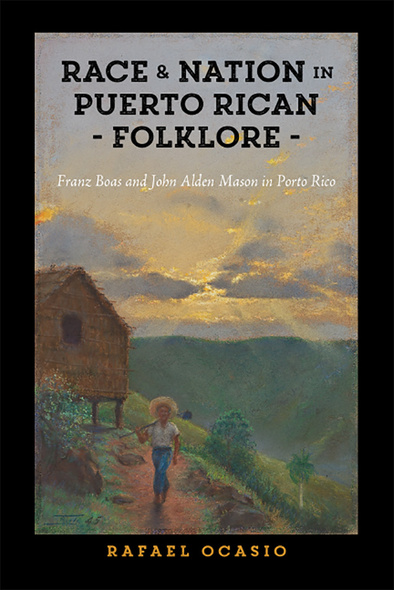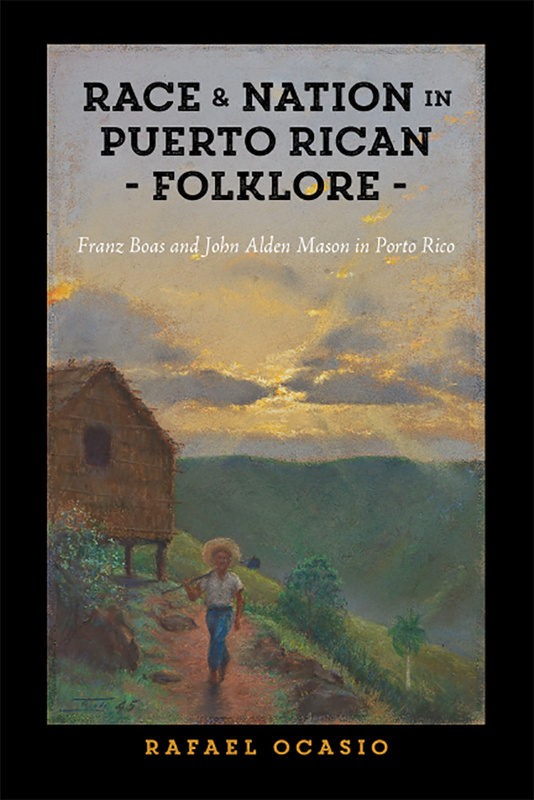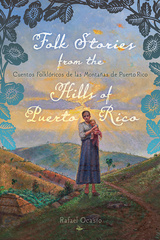Our shopping cart is currently down. To place an order, please contact our distributor, UTP Distribution, directly at utpbooks@utpress.utoronto.ca.

252 pages, 6 x 9
4 b&w images
Paperback
Release Date:14 Aug 2020
ISBN:9781978810204
Hardcover
Release Date:14 Aug 2020
ISBN:9781978810211
Race and Nation in Puerto Rican Folklore
Franz Boas and John Alden Mason in Porto Rico
SERIES:
Critical Caribbean Studies
Rutgers University Press
Race and Nation in Puerto Rican Folklore: Franz Boas and John Alden Mason in Porto Rico explores the historic research trip taken to Puerto Rico in 1915. As a component of the Scientific Survey of Porto Rico and the Virgin Islands, Boas intended to perform field research in the areas of anthropology and ethnography while other scientists explored the island’s natural resources. A young anthropologist working under Boas, John Alden Mason, rescued hundreds of oral folklore samples, ranging from popular songs, poetry, conundrums, sayings, and, most particularly, folktales while documenting native Puerto Rican cultural practices. Through his extensive excursions, Mason came in touch with the rural lives of Puerto Rican peasants, the jíbaros, who served as both his cultural informants and writers of the folklore samples. These stories, many of which are still part of the island’s literary traditions and collected in a bilingual companion volume by Rafael Ocasio, reflect a strong Puerto Rican identity coalescing in the face of the U.S. political intervention on the island. A fascinating slice of Puerto Rican history and culture sure to delight any reader!
Race and Nation in Puerto Rican Folklore is a must-read for those interested in the cultural layout of early twentieth-century Puerto Rico and its burgeoning, sociopolitical consciousness. Ocasio expertly traces the multicultural artifacts of oral transmission collected by ‘the Father of American Anthropology,’ Franz Boas and his mentee, John Alden Mason, on the Island at the turn of the century, revealing the relationship between those texts and Boricua identity.
Rafael Ocasio's Race and Nation in Puerto Rican Folklore will be of significant interest to students of Puerto Rican culture and history as it skillfully revives important events involving the U.S. and Puerto Rico that have lost definition with the passing of time, even if they have not lost relevance. The author brings to bear on an anthropological topic his unique talent for literary and cultural criticism.
Race and Nation in Puerto Rican Folklore fills in gaps both in the historiography of Puerto Rican cultural history and in the history of folkloristics in the United States. Necessary and timely issues of race, colonialism, and class as they affected the collecting and editing processes are addressed in detail. Issues of gender inequality and the effects of not including adult women in the collection, are mentioned but not unpacked at the same level.
Greyhound Grad Publishes Two Books Focused on Puerto Rican Folklore,' by Desiree Cooper
For all these dazzling discoveries made with academic and intellectual rigor, you have to read this new book by Rafael Ocasio. I read it with interest, with amazement and, above all, with gratitude.
Race Nation in Puerto Rican Folklore, Ocasio, then, makes his impact on the future of his island, as well as on a future in which we study and document small, still colonized, nations, and by doing so state that they are not expendable. That no nation is.
RAFAEL OCASIO is the Charles A. Dana Professor of Spanish at Agnes Scott College in Atlanta, Georgia.
List of Illustrations
Introduction: Retention and Reinvention of Puerto Rican Oral Folklore Tales
1 Porto Rico as a Colonial Scientific Laboratory: Documenting Puerto Rican Oral Folklore
Part I: The Island of Porto Rico in the U.S. Public Eye
Part II: Identifying Porto Rican Folklore: The Compilation Process
2 A Post-Spanish American War National Identity: Editing Puerto Rican Folktales in a Socio-Political Vacuum
Part I: Arguing about La Raza and a Native Puerto Rican Culture
Part II: Editing in a Socio-Political Vacuum: Personal and Professional Differences
3 Jíbaros’ Authorship through Self-Literary Characterization
Part I: A Countryside-inspired Folklore through Jíbaros’ Authorship
Part II: Juan Bobo and Other Native Picaresque Characters: Surviving the Rural Campo
4 Telling a Story about Class and Ethnicity through Fairy Tales, Cuentos puertorriqueños and Leyendas
Part I: Expressing Jíbaro Cultural Values through Native Oral Folklore
Part II: El campo as a Site of Puerto Rican Identity in Cuentos de encantamiento, Cuentos puertorriqueños and Leyendas puertorriqueñas
5 An (Un)colored Puerto Rican Culture: Unpublished Negro Fieldwork in Old Loíza
Part I: Loíza as a Site of an Afro-Puerto Rican Culture
Part II: Reconstructing A Post-Slavery Afro-Puerto Rican Popular Folklore: The Unpublished Field Notes
6 Tropicalizing the Puerto Rican Racial Past: The Quest of an Indian Area
Conclusion
Acknowledgments
Notes
Bibliography
Index
Introduction: Retention and Reinvention of Puerto Rican Oral Folklore Tales
1 Porto Rico as a Colonial Scientific Laboratory: Documenting Puerto Rican Oral Folklore
Part I: The Island of Porto Rico in the U.S. Public Eye
Part II: Identifying Porto Rican Folklore: The Compilation Process
2 A Post-Spanish American War National Identity: Editing Puerto Rican Folktales in a Socio-Political Vacuum
Part I: Arguing about La Raza and a Native Puerto Rican Culture
Part II: Editing in a Socio-Political Vacuum: Personal and Professional Differences
3 Jíbaros’ Authorship through Self-Literary Characterization
Part I: A Countryside-inspired Folklore through Jíbaros’ Authorship
Part II: Juan Bobo and Other Native Picaresque Characters: Surviving the Rural Campo
4 Telling a Story about Class and Ethnicity through Fairy Tales, Cuentos puertorriqueños and Leyendas
Part I: Expressing Jíbaro Cultural Values through Native Oral Folklore
Part II: El campo as a Site of Puerto Rican Identity in Cuentos de encantamiento, Cuentos puertorriqueños and Leyendas puertorriqueñas
5 An (Un)colored Puerto Rican Culture: Unpublished Negro Fieldwork in Old Loíza
Part I: Loíza as a Site of an Afro-Puerto Rican Culture
Part II: Reconstructing A Post-Slavery Afro-Puerto Rican Popular Folklore: The Unpublished Field Notes
6 Tropicalizing the Puerto Rican Racial Past: The Quest of an Indian Area
Conclusion
Acknowledgments
Notes
Bibliography
Index





